#BSD Gogol analysis
Text
I came across the realisation that Nikolai's motivation to kill Fyodor, as we understand it now, isn't compelling. I think that's my biggest issue with him. There are all these fanfics about it, and yet the one I've read where Fyodor's death is compelling, Nikolai hasn't ever even thought of killing him and doesn't want him to die (and yes, I'm including my fics with Fyodor's death in the "not compelling" category).
So, I tried to reframe it, taking some of my current experiences and what I know about Gogol, and I think I may have figured something out: Nikolai's core motivation right now could be to escape from reality.
This could be foreshadowed earlier on with things like a distaste for factually accurate (read: dull) stories, a love for acting and exaggerated impressions, and an aversion to talking issues out in his personal relationships.
But now it's worse, and has grown to an extent where he can't stand anything--he just wants to escape everything, but he can't. (This change would be brought about by some sort of terrible or tragic event--something that makes all his flawed coping mechanisms collapse entirely in a way they never have before. In my story, it's Fyodor disappearing and Nikolai finally giving up hope that he still lived. Anything awful enough would probably work, but I think a lot of care needs to be put into exactly what is the thing that pushes Nikolai over the edge--it says a lot about what he values.)
I visualise his wanting to escape reality with Stanzcyk (the Polish painting). Nikolai is the jester, but desperately wishes he could be carefree like the celebrating nobles in the background. But he can't. No matter what, no matter how he tries, he can't escape reality, and so he does the next best thing: he does the unthinkable. He becomes what any normal person can't even fathom, does what any sane man couldn't, and desperately tries to lose himself in it. (In my story, this is a worse version of what's already occurred: a few years ago, Nikolai became an actor in hopes of losing his misery to the stage, but when that failed and he became suicidal, Fyodor helped him pull through. Now, Nikolai tries to lose himself in a much more involved and self-destructive way (notably still through acting), and Fyodor, though much more negatively now, is still the force that's keeping him alive.)
At first, he may have even deluded himself into thinking he'd somewhat succeeded in losing himself, but then Fyodor makes his "in opposition to God" comment, and Nikolai is at once violently dragged back into himself. It's a wonderful feeling to be understood, yet terrible, because as long as such an anchor exists, he can never escape (bonus points if in a backstory fic, Fyodor being Nikolai's anchor to reality was a positive in their relationship, creating a contrast here).
And so now, every time he thinks about wanting to share a thought or idea with Fyodor, the only person with whom he can genuinely converse, he first gets a nice feeling at the thought, then falls into despair at the thought of losing that connection (Fyodor is constantly putting himself in mortal danger, and as much as Nikolai believes in him, it also makes sense to me that he'd be worried out of his mind at times), anger that his emotions still control him, and this reinforces his feelings of needing to escape. It's a constant merry-go-round of love and misery, and he just wants to be on stable ground, essentially.
And I think if I do that, it starts to be compelling. It's not quite there, let alone polished, but it's a lot farther than I've gotten before. And 'Arcane' story analyses are really helping me with contrast, callbacks and foreshadowing.
#as I'm terrified of losing the one person who understands me I've come to understand that part of him a lot more#it's a truly awful feeling--indescribable#but that's why it's so compelling#and I think it being his love for Fyodor that drags him down. but also pulls him up is a lovely idea#it adds a human element that's sometimes missing in his character#BSD#BSD Nikolai Gogol#BSD Nikolai#BSD Gogol#BSD Gogol Nikolai#BSD Nikolai Analysis#BSD Gogol Analysis#BSD Analysis
63 notes
·
View notes
Text
Bungo stray dogs fans will really watch a character get cut in half, drowned, shot in the head, blown up and have characters prepare for another character's funeral and be like i wonder how they survived because they couldn't have possibly died.
#not even IF#but HOW#and thats not even the crazist part#the craziest part is that we're always right#bungo stray dogs#bsd theory#bsd analysis#bsd anime#bsd manga#anime and manga#manga#bsd chuuya#chuuya nakahara#bungo stray dogs chuuya#bsd dazai#dazai osamu#dazai being dazai#bungo stray dogs dazai#bsd fyodor#fyodor dostoevsky#fyodor dostoyevsky bsd#bungou stray dogs fyodor#bsd akutagawa#akutagawa ryuunosuke#bungo stray dogs akutagawa#bsd higuchi#higuchi ichiyo#bsd nikolai#nikolai gogol#mypo)t
776 notes
·
View notes
Text
MAJOR SPOILERS FOR BUNGOU STRAY DOGS CHAPTER 114!
GUYS IF FYODOR CAN POSSES A PERSON WHO TOUCHES HIS BLOOD AFTER HE DIES, WHOS CURRENT HOLDING HIS BLOODSOAKED SEVERED HAND
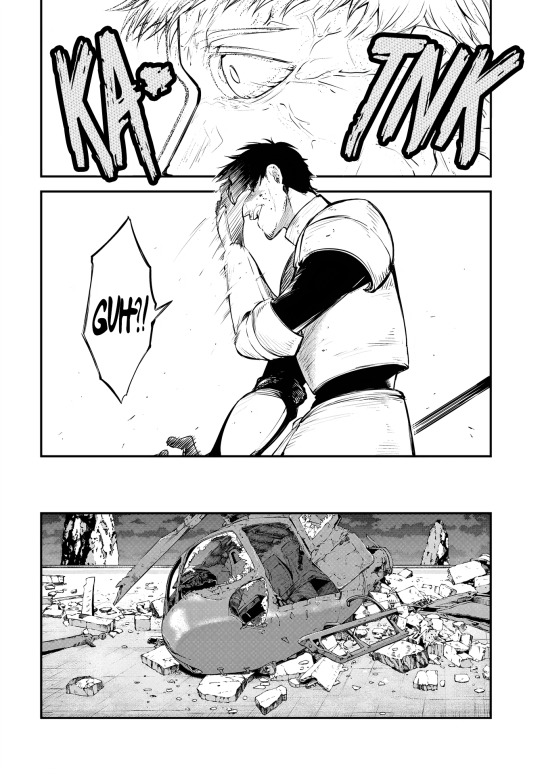
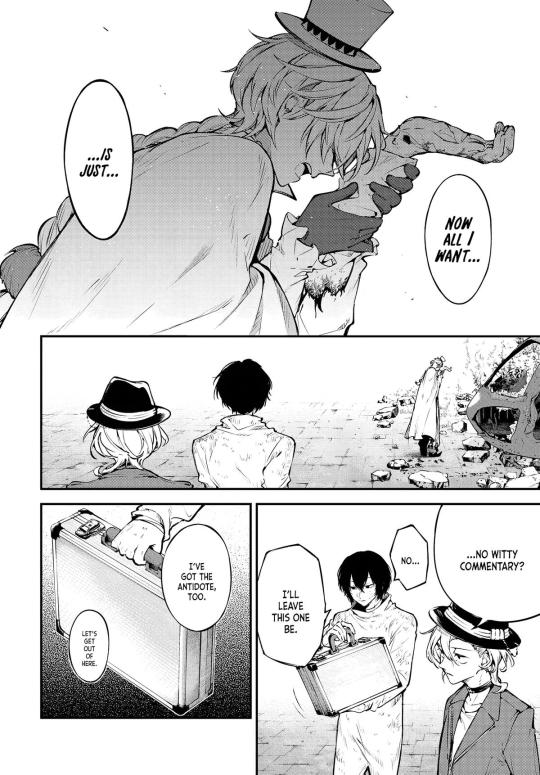
Fyodor promised to come after Gogol for trying to kill him and having the character who imbodies manipulation overwrite the free will of the character who above all else wants to break free of all control would be such a cruel and interesting twist, its so in in character for Fyodor to make Gogol care about him so strongly then destroy the greatest wish of Gogols heart
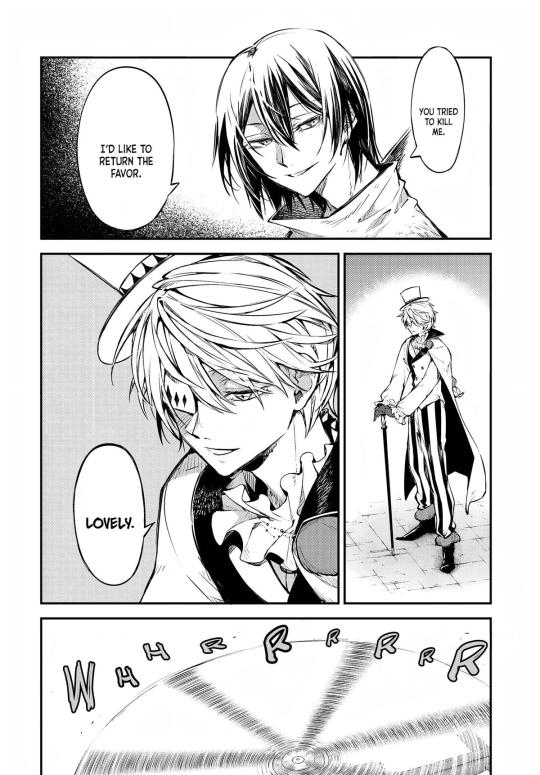
#bsd#bungou stray dogs#bungo stray dogs#bsd chapter 114#bsd manga spoilers#bsd manga#bsd fyodor#bsd fyolai#bsd nikolai#bsd gogol#fyodor dostoyevsky bsd#bsd analysis#bsd theories#bungou stray dogs theory#bsd theory
242 notes
·
View notes
Text
"My God, my God, why hast you forsaken me."
Fyodor said that as he allegedly died.
Those are also Jesus' last words according to the book of Matthew (chapter 27 verse 46) and the book of Mark (chapter 15, verse 34).
Which is interesting because in the book of John (chapter 19, verse 30) it is recounted as him saying "It is finished".
And in Luke (chapter 23, verse 46) it is written he said "Father, into your hands I commit my spirit."
So, we have a few reasons why Fyodor may have said the first one rather than the last two. (or why the writers chose this particular verse)
From a writing point of view, Fyodor is a 'religious' character, and what he said is simply a nod to that. It also is easily recognized as a line pulled from the bible. ("My God, my God, why hast you forsaken me," is written in both Matthew 27 and in Psalm 22, Jesus was quoting David). Fyodor could be quoting one or both of them.
The writers are trying to foreshadow a return. @originalaccountname made a post mentioning the timeline, how the plan is to use the page in three days. Jesus died and resurrected on the third day. Coincidence? Possibly not.
Dying was not Fyodor's plan. If so "It is finished" would have probably been Fyodor's choice of words if he had a plan to die and come back. That part of the plan being finished and all.
Any of these seem like plausible reasons, so it is hard for me personally to settle on one. I'm also still kind of trying to wrap my head around this last episode. It's weird to not have already read the manga, and the episode itself feels off.
#bsd#my stuff#screaming into the void#and the void screams back#bsd spoilers#bsd season 5#bsd meta#bungou stray dogs#bungou gay dogs#fyodor dostoevsky#bsd fyodor#soukoku#bsd dazai#dazai osamu#bsd chuuya#chuuya nakahara#nikolai gogol#bsd nikolai#bsd sigma#bsd analysis#jester thinks
368 notes
·
View notes
Text
so. fyodor sees himself as a servant of god, as if he is a jesus like-figure. and nikolai was teamed up with fyodor but eventually chose to betray and try to kill him, much like judas.
and jesus knew he was going to be betrayed by judas, as fyodor accepted and challenged nikolai’s betrayal.
judas also felt great remorse and sadness as well as guilt for his betrayal after jesus’s death; similar to nikolai’s conflicted sadness towards fyodor dying.
this implies that fyodor and nikolai is a strange, fucked up version of jesus and judas. in this essay i will-
#ive seen peopel talk about narrative similarities but not exact examples so. this is how i intrepreted it#i could go in detail.#i did some research as well and there are definite parallels.#bsd#bungou stray dogs#bsd fyodor#fyodor bsd#fyodor dostoevsky#bsd nikolai#nikolai bsd#nikolai gogol#fyolai#bsd analysis#bsd spoilers
307 notes
·
View notes
Text
Last chapter's anime and manga differences side by side because I have nothing else to analyze

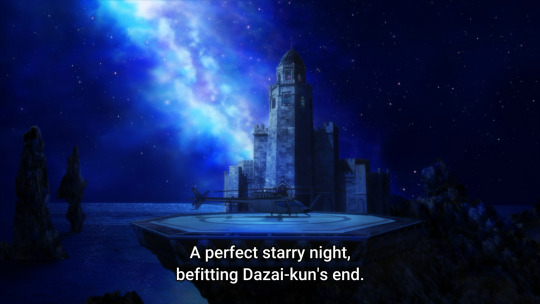
→ This line is missing in the manga
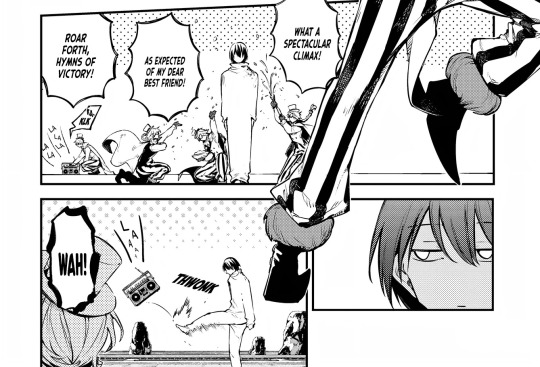
→ Gogol's stereo gag is missing in the anime

→ This line is missing in the anime (bonus points for foreshadowing)

→ Dostoyevsky elaboration on why he's not taking the antidote immediately is missing in the anime, with him simply saying “I'll take it in the helicopter” instead


→ This line is different between the anime and the manga. I'm not sure if it's just a translation difference, but in case it isn't, I found it interesting. The anime line puts more emphasis on Dazai's lack of value, while the manga wording is more neutral and polite, with Dostoyevsky framing it as if it was his own fault for having overestimated Dazai (I know it's a subtle difference, but I still found it noteworthy).
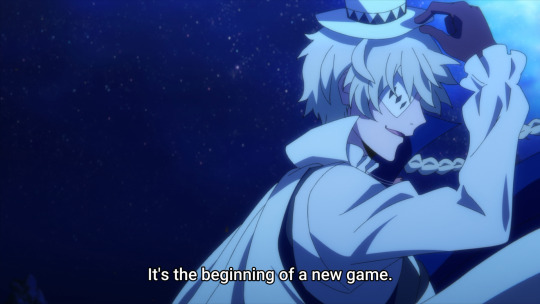
→ This line is missing in the manga



→ The introduction to Dostoyevsky's stabbing is completely different between the anime and the manga. In the anime, Dostoyevsky lets the briefcase fall and Gogol comments on it, while in the manga Gogol makes remarks on the liquid escaping the helicopter's door.
#fyodor dostoevsky#nikolai gogol#bsd#bungou stray dogs#bsd ch 111#bsd analysis#my analysis#mine#We're just at minute 06:11. My God#We're not catching up with the anime in another six months#I hate it here#At least Akutagawa next chapter...
167 notes
·
View notes
Text
About Chapter 114
okay imo Fyodors imortality is bc of his ability to possess other peoples bodies but i have seen people saying that it'll be sigma and idk about that. I think the most logical conclusion would be Nikolai. For one, he's technically the reason Fyodor 'died' just like the guard in the flashback but it would also fit so well within his character arc. There is a parallel of the overcoat in 'the overcoat' and his freedom being ironically taken right after he gets it. Also Nikolai already planned to kill himself and if he actually was posessed his death would also mean his freedom from fyodor. Nikolai was also near his dead body for the whole time, maybe thats also relevant. I mean where is Nikolai?
#bsd#bungou stray dogs#bsd ch 114#bsd 114#bsd114#bsd theory#bsd analysis#bsd nikolai#nikolai gogol#bsd fyodor dostoevsky#fyodor#nikolai#garlic rambles#bsd sigma#fyodor dostoevsky
143 notes
·
View notes
Text
#rbing with my opinion#and feel free to explain why. i love reading all the collaborative thoughts#as we’re not totally sure the specifics of how his ability works. this is just a hypothetical#but i’m curious to see what people are thinking#bsd#bungou stray dogs#bsd polls#bsd manga#bsd 114#bsd chapter 114#soukoku#skk#bsd theory#bsd dazai#bsd chuuya#bsd fyodor#bsd sigma#bsd nikolai#dazai osamu#nakahara chuuya#nikolai gogol#fyodor dostoevsky#sigma bungou stray dogs#bsd analysis#polls#bungo stray dogs#bsd spoilers#bsd 114 spoilers
55 notes
·
View notes
Text
I'm not sure if I'm onto something here but this page/explanation plus everything that follows has always been suspicious to me
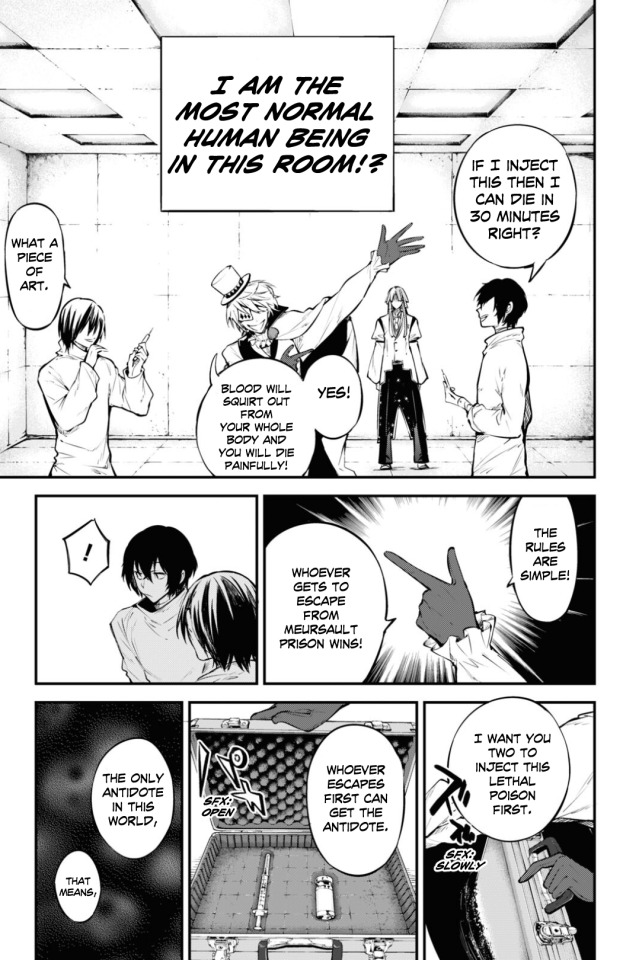
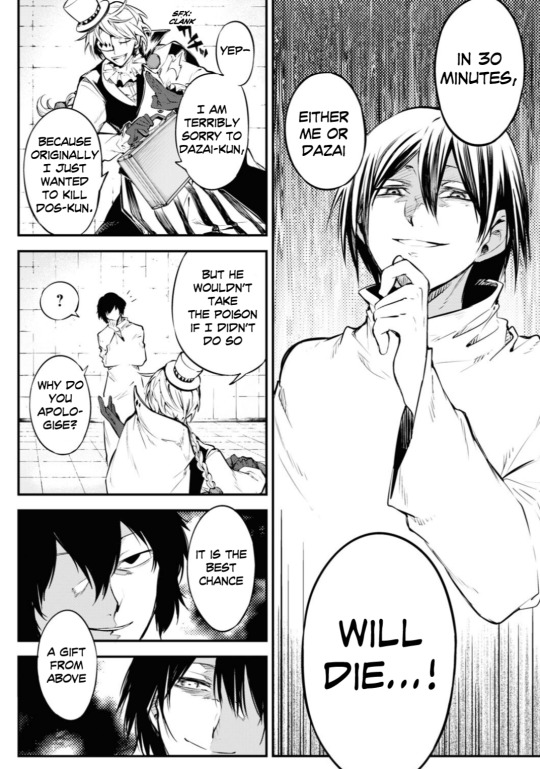
First and foremost: blood poisoning isn't most peaceful way to die, far from that. If poison is so lethal Dazai and Fyodor are supposed to die in 30 mins symptoms would have started showing right away - and yet throught whole Meursalut escape arc we see none. Not a single 'I'm feeling weak'. It's stated that Fyodor spent 5 mins just waiting for Chuuya to arrive so I'm really doubtful whole sequence of him and Chuuya nearly drowning, then killing time halting ability user, trying to drown Sigma and Dazai, Fyodor's and Sigma's confrontation and Fyodor's escape could have happened under 25 mins. Of course, it could be that whatever Nikolai gave them takes more than half an hour to kill a human but that still doesn't explain 1) why no symptoms 2) why neither Dazai nor Fyodor seem to be in the hurry to leave
Therefore my assumption is that whatever Nikolai gave them wasn't lethal in the first place.
But why lie then? Why organize the whole game to begin with?
Well, it's certainly challenging to determine motives of character as unpredictable as Nikolai. His absurdist life philosophy of seeking freedom by trying to escape himself and what makes him human certainly doesn't help the case. One of guesses can be pure entertainment, just for sake of it. For an entertainer it fits the bill. But I think there's more to it.
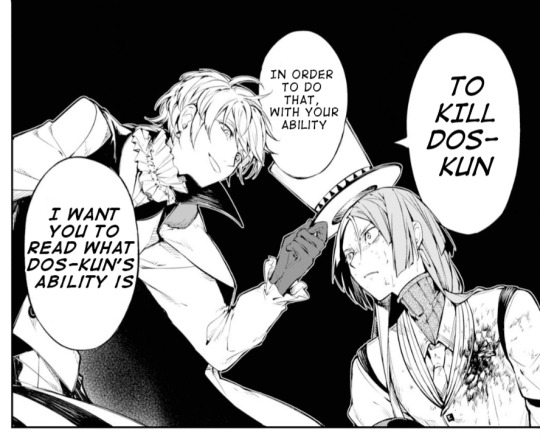
Except he doesn't really. By now we know whatever Fyodor's ability is that it isn't combat one - if Nikolai wanted to kill him he wouldn't necessarily need to know what it is. Not to mention Sigma can extract info from corpses, meaning they can kill Fyodor and then find out about his ability. While I'm certain Nikolai doesn't really want Fyodor dead, I can't claim with absolutely certain at that point in manga he's aware of that himself (of course he is after Fyodor 'dies' later on).
Much rather than that I think Nikolai is trying to kill what Fyodor evoke in him - feeling of being understood and wanting to understand other in return. That'll explain the game, trying to break Fyodor out of the prison without being too straightforward about it because he himself cannot decide what he really wants and stick by one decision, putting trust on test, wanting to know about Fyodor's ability and generally about Fyodor and so on.
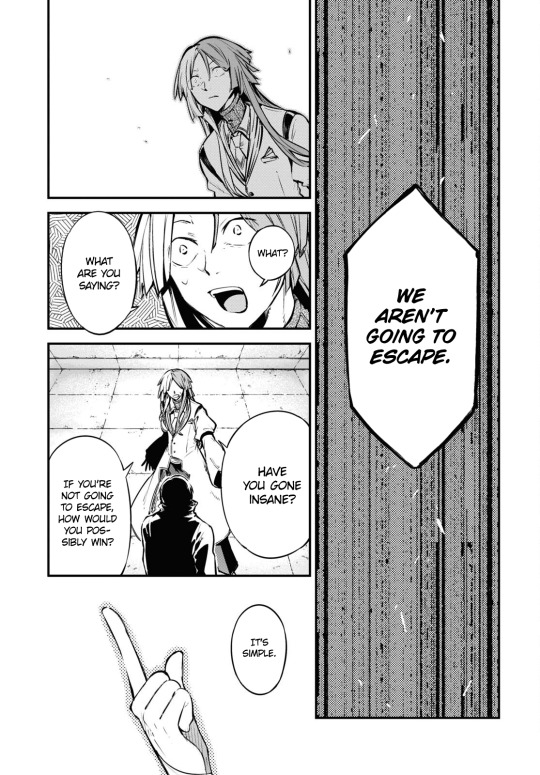

While it's definitely arguable if Dazai would receive an antidote if he just killed Fyodor without actually escaping, it's also worth noting he was leisure with time (aka had time of his life soft bulling Sigma). Of course, chapter where Dazai talks with Nikolai post all the mess is yet to come out so it's impossible to tell in advance, but I have a hunch Dazai knew right from the start there's no danger of blood poisoning. Or at very least took gamble on that. Nikolai said something among "my apologies I have to poison you too but he (fyodor) wouldn't take the syringe otherwise" so it's clear right off the bat Dazai doesn't really hold his interest in that whole game. He's there for Fyodor and brought Sigma with him to extract information out of him.
As for Fyodor, did he knew blood poisoning wasn't a thing? Before chapter 111 I would have said yes given he too didn't seem to he in the hurry to escape, had no symptoms and didn't take the antidote right off the bat when Nikolai gave it to him. But then we have this:
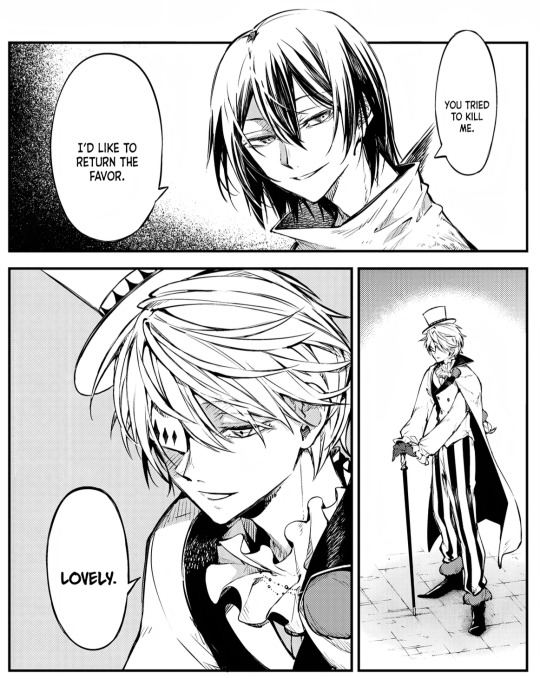
Does Fyodor mean poison or game itself? My guess is poison because if latter that'd imply Fyodor expected Nikolai to help him break out of Mesaurlet which would imply broken trust. And we all know Fyodor and placing trust in others is like oil and water
To me Nikolai looks straightout dejected here. He's a performer that revels in these types of high stakes game, he should be grinning like a madman - but he's not. So in my opinion he was searching something from Fyodor here that he didn't quite get. It could be just in this scene/exchange or in whole game. But if my hunch that Nikolai was trying to get Fyodor out of Meursalut just needed Fyodor to place iota trust in him is correct, then Fyodor stamping over that hope and failing to see Nikolai's intention wasn't to kill him despite his theatrical proclaims it is would be reason for dejection. Whatever bids for connection he was looking in Fyodor likely won't be returned because of Fyodor's mistrust in people and abiding by cold rationale rather than intuition/emotions.
Therefore my conclusion is that whole Gogol game was a test:
- for Fyodor to put trust in others when he has no rational basis to (his major character flaw) - and that's precisely why he lost in the end. I could go miles here how Dazai put trust in Chuuya (and even Sigma) and how those bonds are very reason he managed to win but that's for some other time gives there's a lot to be talked about soukoku, I'd like to focus on doa trio here.
- for Sigma to realize the difference between being used and being of use, aka realize difference between transaction and a bond. I'd say he did well by placing trust in Dazai but it's yet to be seen if his decision to take Fyodor's hand was the 'right' one. His character arc ain't over, it heavily depends on what info he extracted from Fyodor so it's too early to tell how it'll go. Also this depends on Dazai's actions anime hasn't shown, like will he stick to his promise to save Sigma or not. Given promise he made to Oda 4 years before, I think it's definitely in character for Dazai to come back for him, fetch comatose Sigma and bring him to Yokohama.
- for Nikolai himself to realize what he wants to do with feeling of emotional/intellectual connection he deemed as 'imprisoning'. He's at conundrum himself what he wants to do with Fyodor: help him or kill him - accept the instinct or fight against it for no other reason than to oppose very self - lose sight of himself in the end just like Fyodor said. If we go by anime ending (I doubt manga one will be much diffrent), he came to realization how Fyodor changed his life and how he actually never wanted him dead but it was too late by then. Now haunted by realization only one who ever understood him and only person he ever felt connected to is dead, Nikolai will come to realize true hell of being imprisoned by own mind without means of escaping.
All three of them had some sort of downfall induced by their 'cardinal sins'; their own 'decays' as downfalls source from inner character flaws, so to speak.
#my ramblings#bsd analysis#bsd#bsd sigma#fyodor dostoevsky#nikolai gogol#dazai osamu#and i guess this is sort of#fyolai#bungou stray dogs
135 notes
·
View notes
Text
Chapter 110 Official Art Analysis
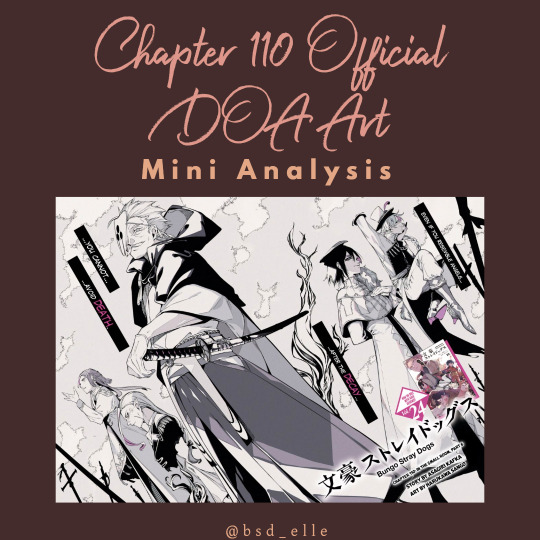
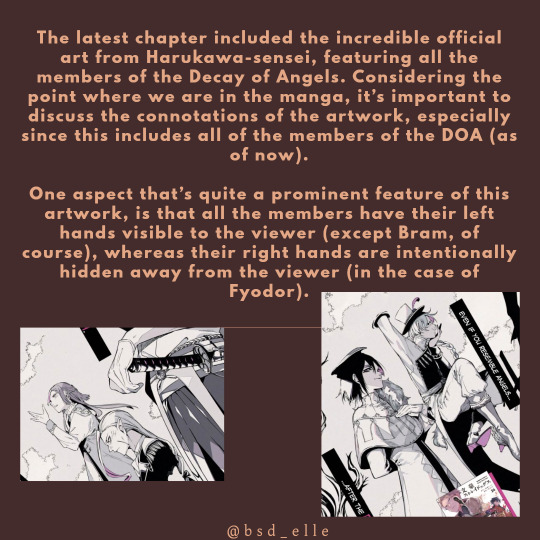
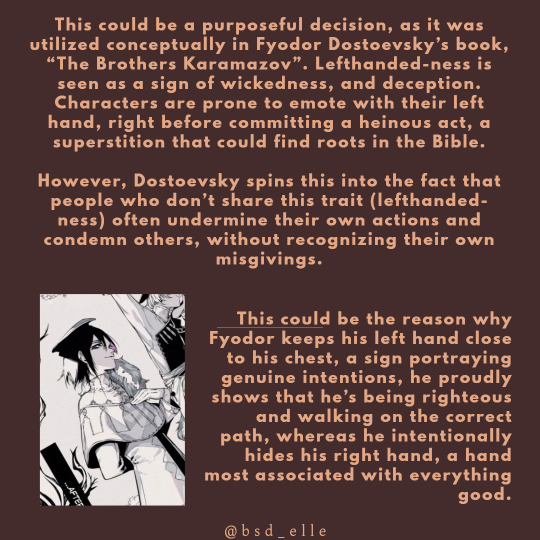

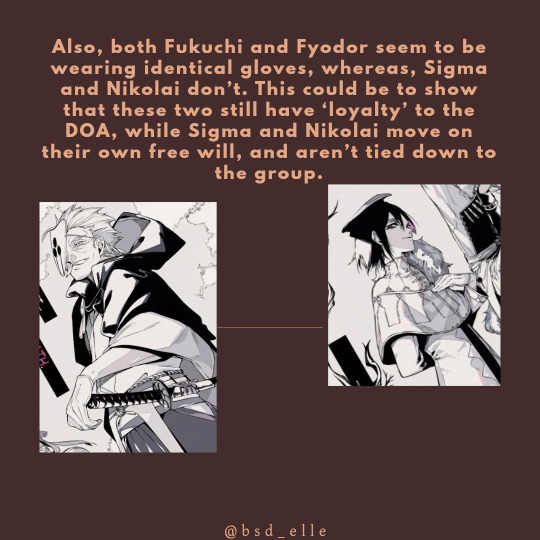
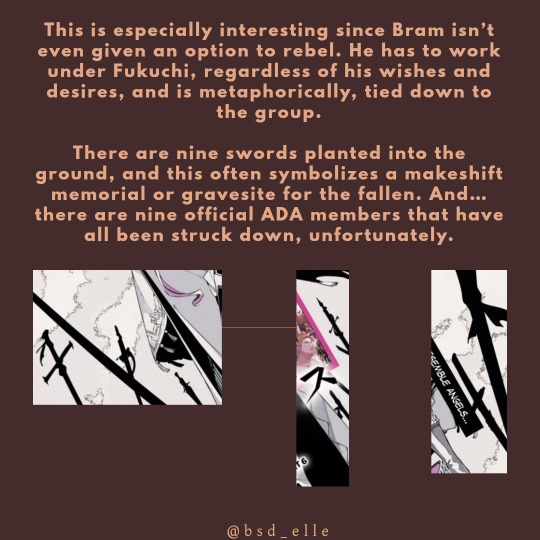
#bsd manga#bsd#bungo stray dogs#anime#manga#bsd anime#bsd analysis#bsd x reader#bsd dazai#meta#bsd nikolai#bsd fyodor#bsd dostoevsky#fyodor bsd#nikolai gogol#bsd sigma#bsd symbolism#bsd chuuya#bsd season 5#dazai osamu#bsd spoilers#osamu dazai
139 notes
·
View notes
Text
actually I think that fyodor and nikolai ARE friends, that fyodor genuinely intends to be a friend to nikolai. That nikolai genuinely does value fyodor.
but I also think that friendship is really, really fucking codependent. I think that fyodor needs nikolai to rely on him. I think fyodor provides nikolai a sense of acception and belonging because nikolai will return this with wholehearted belief in him. I think that fyodor needs a challenge, a challenge that nikolai provide without becoming a driving problem for fyodor. I think the spirit of their friendship is "if you accept my flaws and quirks and oddities I'll accept yours. I'll feed into them and enable your behavior" I think that, if anything, fyodor is dazai's opposite. the reason fyodor is so bad, the reason fyodor is a "demon" like dazai was, is that he has no one to form a balanced relationship with him. He has someone who accepts him and his flaws and supports him. He has many, many people who try to challenge him on his wrong beliefs. I think he needs someone who does both. I think the reason fyodor, as a person, cannot develop is because he is so trapped in this loop of competition with those on his level and manipulation of those below it, is because he hasn't realized all of this. Unlike dazai, fyodor hasn't realized, or doesn't completely understand, that even some "godlike genius" such as him or dazai can enjoy the company of others. I think the same goes for nikolai too. I think, even though he's not on the same iq level as fyodor, I think they both have the same low emotional intelligence. Nikolai just responds to this "outlandish idea" of enjoying someone's company much more violently. I think that Nikolai wants to kill fyodor not out of a desire to be free, but out of a fear of being trapped. I think that he's, like fyodor, hasn't processed the value of being friends with someone. However, I think that nikolai, instead of ignoring this like fyodor, takes action and blames it on his mentality. I also think they're both mentally ill
#fucking nonsensical rambles I wrote during dinner#fucked up fyolai thoughts#not really ship but take it how you will#fyolai#bungou stray dogs#bsd#bungo stray dogs#nikolai gogol#bsd fyodor#fyodor dostoyevsky bsd#bsd nikolai gogol#bsd analysis#kinda??? just having thoughts#BYE THEY ENABLE EACHOTHER SO MUCH </3
244 notes
·
View notes
Text
Some Things We Know Canonically About Nikolai

He can sew (since he sewed that skin shirt).
His Japanese is proficient enough for him to be able to pass as a Japanese secretary for six months, meaning that his grammar, tones, reading, writing, typing, and mannerisms are all native-level.
He can not only connect space with his Ability, but fuse one object into another if his Ability's output space is connected to a solid object (Atsushi's leg into concrete as the example).
He knew Fyodor before Fyodor was as proficient in Japanese as he is now (since Fyodor is still learning Japanese in the omake).
He knew Fyodor at least semi-well before the plot of Sunday Tragedy (both his recollection to Sigma and various omakes confirm this).
He isn't very familiar with the concept of a band (says, "It's like an orchestra, right?" when Sigma mentions a band in an omake).
He feels guilt and remorse when he kills people (according to himself).
He knew about Atsushi's Ability before they met (called Atsushi "Tiger Boy" when they first met, said that the rumours about his were true, and might have stabbed him knowing about Atsushi's regenerative ability).
He knew about Dazai's Ability too (and tested whether he could bring Dazai through a portal anyway).
He doesn't seem interested in killing people who aren't "targets", or at least, that's his reason he gives to Atsushi for why he kept him alive. I don't think he kills indiscriminately.
Nikolai envies people who are in the cage but can't see it, possibly meaning that he wishes he didn't see it at all, and that he's only trying to escape because he can't help but know it's there (meaning he doesn't think he chooses to see the world this way).
Nikolai is drawn to, or at least thinks very highly of, people who help others and do the right thing, even at the expense of themselves (based on what he says to the ADA right before he's sawed in half).
He can perform some sort of auto-blood-transfusion-thing, or "loop the blood back into [someone's] body" (he did it with Sigma).
Dazai can fall through one of Nikolai's space connection portal things, meaning that the connected spaces in each of the rooms themselves somehow aren't being touched by his Ability (or at least, the visible connected spaces outside of his cape are only connected to his Ability via the portal walls, so the space connection process must happen within his Ability's space, and not in the "real world"). This also has to imply that either Nikolai can move an object through two connected spaces without having the object touch his cape, or that his cape isn't actually connected to his Ability (though second option seems very unlikely, the portal Dazai falls through is connected to the ceiling of the room that Nikolai is in, which he can't touch, so he really may be able to connect space without it strictly being through his cape, as opposed to what was implied in every instance before).


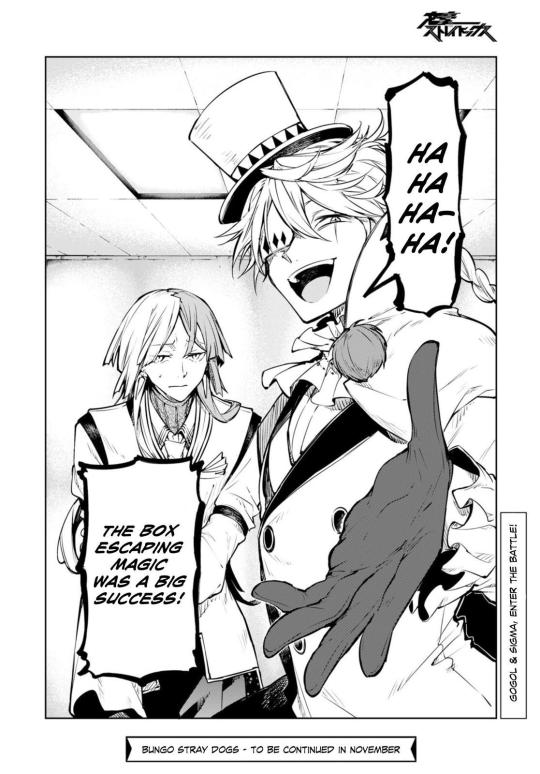

His right eye seems to turn pitch black when he's overtly lying/putting on an act, and looks more 'clear' when he's being more truthful.
Some Things That Could be Interpreted
He may have helped Fyodor with Japanese at some point (based on how you interpret his Japanese pun omake moments).
He may be only partially/mostly used to modern society, depending on how you interpret his historically-inspired attire and not knowing what a band is.
He doesn't derive any pleasure at all from killing or hurting people (not outright stated but implied, from what I can tell from his expressions, the "enjoyment" in such activities seems entirely feigned).
He might not be interested in maiming people who aren't targets, since he probably knew about Atsushi's regenerative ability beforehand, though that might not be the case. It depends on whether or not shooting Tonan was part of a plan, I think.
He might not be interested in playing certain characters outside of their roles. For example, for Atsushi, who isn't a target but is part of the ADA, he drops the clown persona for a moment. He does it again for Tonan right before he releases him. Though there isn't much to go on, it could be interpreted here that he doesn't play acts for people said acts aren't originally meant for.
He might see people who are "in the cage" similar to actors on a sort of improv stage. If you think of his secretary act as being who he needed to be to have Tonan cooperate (and thanking Tonan twice for pretty much acting exactly as planned), then it could be similar to him thinking that Akaky Akakievich's superiors interacted with him exactly as they should, or if not as they should morally, then add they should societally, which ultimately trumps morality. All of this, Nikolai would think of as detached from himself, yet as he's still in the cage physically, and not yet even out (can only see the bars where others can't), he could watch and muse at all these goings on, and when it comes to him having to interact with those almost scripted personalities, he might script a personality for himself, working within the play that people unintentionally mould themselves into, being the exact sort of person that they need to interact with in order for them to make his desired result happen. (In action, this would be him being the meek, simpleminded, pitiful secretary, who seems only to exist in order to be briefly bullied and ordered by his superior, the Minister of Justice. And Tonan would have every right to treat the Secretary this way, would even be expected to, and it's such a normal scene that neither Tonan nor anyone else would think anything of it, they'd simply gaze over their interactions as though they were part of the wallpaper, and it would give Nikolai plenty of leeway to do whatever he needed to do in the government. It's also present in how he talks about being the sort of person the people he's killed needing to see, for them to think of him as a psychopath in order to find peace, so he played a psychopath for them {Tonan actually fits this description of needing it, too, and if you read it back, I think that exact interaction Nikolai described to Atsushi was happening when Nikolai untied Tonan}.

And yet he breaks the act, which doesn't fit his script at all, and you can see the moment it all slips from an orchestrated play into reality, if only for a moment.
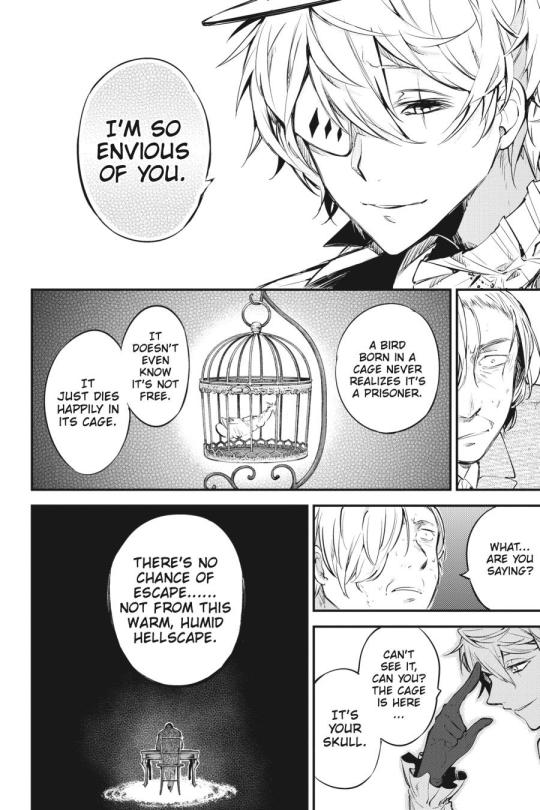
Though I suppose there's also some irony here, that when Nikolai's breaking his personal script, he's saying lines scripted for him in the Book.)
Considering the way he thanks Tonan for his help, although somewhat mocking, I think enough in his expression when he's talking about the birdcage at Tonan to imply that he doesn't take how Tonan treated his Secretary persona personally (in his "I envy you" speech).
The particular way he always positions/moves his hands could be indicative of something, but of what seems completely open to interpretation.
Considering what he knew about Atsushi and Dazai's Abilities, he may know all of the ADA's Abilities.
#Oct. 2022#BSD#BSD Nikolai#BSD Gogol#BSD Nikolai Gogol#bsd gogol nikolai#bsd gogol theory#BSD Gogol analysis#BSD analysis#bsd nikolai theory#bsd nikolai hcs#BSD Nikolai analysis#might add more later#this is just a quick thing i wanted to post to get my thoughts together#and maybe help someone too
278 notes
·
View notes
Text
I remember when I finished bsd season 3, I went to a site and scrolled through the chapters that weren't animated yet; there I saw Nikolai and read his dialogs.
I think it was three or four years ago, I was familiar with his impressions; like 'the insane serial killer clown' and all; but when I read what he said it really came to me as a surprise how much I understood him.
and that claim still stands; I really identify with him the most. I'm sure he's a very hard character to understand to many of the people that follow the series; like 'who would want to kill the person they think of as their best friend?!', but I get him, despite how ill that may sound.
Nikolai's more sane than any of us, although we might think of him as the most insane. He is forged with feelings, he is forged with a body. Nikolai doesn't think, he feels. He feels his chest ache, he feels his head spin, and thinks to himself 'then if I'm free of my body, I won't feel anything'.
He knows that's not true, he knows better than anyone else; but chooses not to believe in it.
Nikolai knows what he is, and he knows he was given no opportunity to choose it, and this pains him; so he denies it.
He runs away from himself, runs away from his feelings; and oh he tries. He tries to tell people this, he tries to make them understand, to ask for help. He walks around talking in excited gibberish philosophy, and in the end, they call him insane and leave.
When they don't understand, when no one understands; he starts killing. He kills to prove to them what he said is true, to show them what they're not willing to use their minds to understand.
He was stuck in this vortex, until Fyodor showed up and made his pain double, no, multiplied.
Fyodor tells him exactly what he wanted to hear so desperately.
"You stand up against god in order to lose sight of yourself."
There, a new feeling bloomed; something he had never felt. We call it love, we call it obsession. Nikolai was terrified, so he made himself a solution: omit the cause, make the pain stop.
again, he knew killing Fyodor wasn't the way out; but chose to believe it was. He was terrified, and I'm sure any interaction he ever had with Fyodor pained him. I say this because I've been there myself, exactly where he was.
now something unexpected has happened, Fyodor's dead.
I doubt Nikolai really ever saw it in himself to kill Fyodor with his own hands, he couldn't, he loved him. He probably just planned on playing around carelessly just like he did, until someday fate itself, god himself, decides for him; and so he did, Fyodor's gone.
Or maybe there was a tiny glimpse of hope, in the bottom of his heart, that god would give him a chance in the end to be with Fyodor. He knew Fyodor didn't care about him, he knew it was all one sided, but he hoped anyway; maybe that was what kept him from performing his plan.
Now it's over, he is left with a void that cleaves his flesh and bone open. I wonder if he'll resist it, I wonder if he can last.
I wonder if he'll suicide :)
#bungo stray dogs#bungou stray dogs#bsd analysis#fyodor bsd#fyodor dostoyevsky bsd#bsd anime#bsd season 4#nikolai gogol bsd#bsd theories#nikolai gogol#bsd nikolai#character study#character analysis#headcanon#my headcanons#analysis
92 notes
·
View notes
Text
This last chapter really shows just how one-sided Fyolai was, Fyodor only saw Gogol as a tool for his own gain, and Gogol knew that.
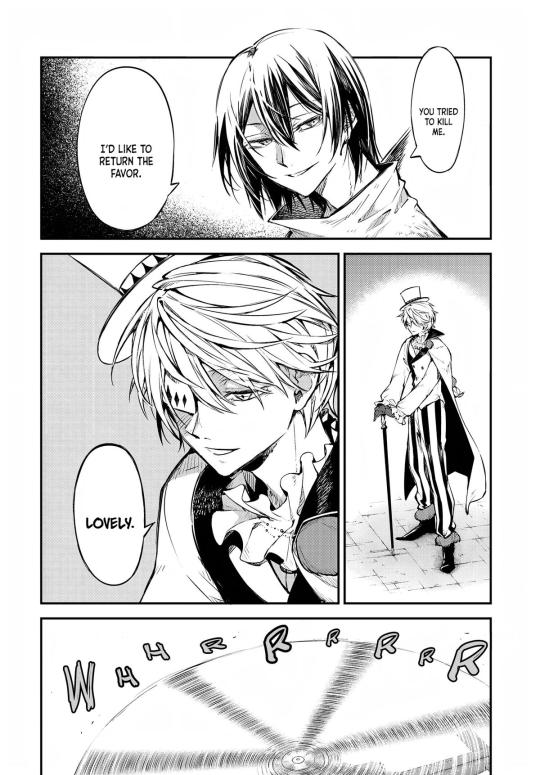
Look at Gogol's expression, the resigned sorrow as he accepts that he never reached Fyodors heart the way Fyodor reached his.
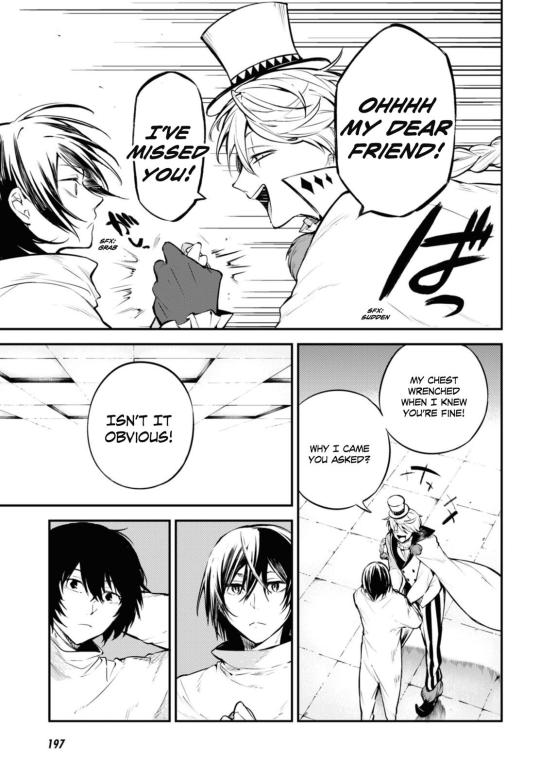

Look at their different reactions to seeing eachother, Gogol is extatic to see Fyodor and puts on a huge display for him, both his love for him as his "true friend" and his desire to kill him. But Fyodor seems completely uninterested in either, honestly he looks like he just wishes Gogol would leave him alone.
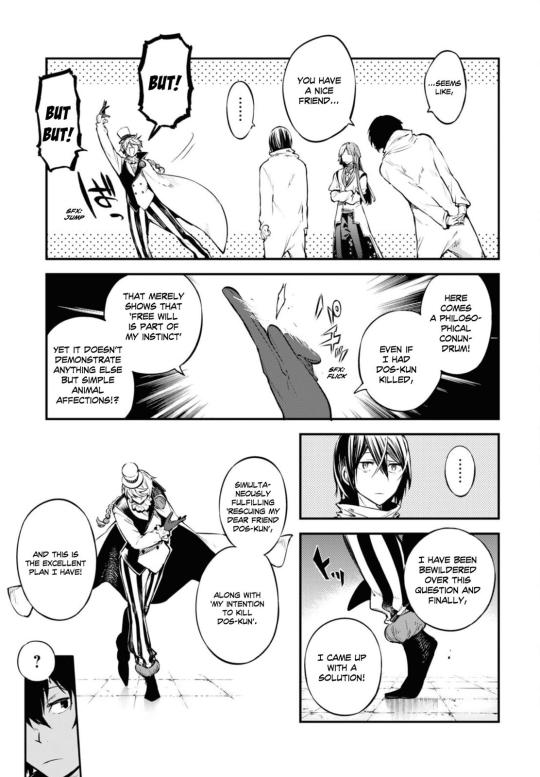
He says nothing to Gogol explaining his motivation and keeps that bored expression as if Gogols philosophical struggle could not be less interesting to him. Heck even Dazai shows more interest then Fyodor does.

In fact, the only thing that makes Fyodor show any interest in what Gogol is doing is when it gives him a chance to kill Dazai, he only sees value in Gogol when he has some strategic benefit for him.

Fyodor is entirely focused on Dazai throughout the whole discussion, he pretty much ignores Gogol entirely, only focusing on how he can use this opportunity to eliminate his biggest threat.
Gogol's care for Fyodor is obvious, he says multiple times that Fyodor is the only one who ever understood him, but he never once implies that he thinks Fyodor cares about him, only that he understood him. He knows Fyodor doesn't share his feelings, and since Gogol surrounds himself with what causes him the most pain I'm sure that this only made him more attached to Fyodor.
Anyway this post was mostly just meant to outline how Fyodor and Gogol feel about eachother in cannon, I think with this latest chapter we can definitively say Fyodor never cared for Gogol as a person, making Gogols tragedy even deeper



#bsd#bungou stray dogs#bungo stray dogs#bsd analysis#character analysis#bsd spoilers#bsd chapter 111#fyodor bsd#fyodor dostoyevsky bsd#bungou stray dogs fyodor#fyolai#bsd nikolai gogol#bsd nikolai#shipping#bsd ships#bsd character analysis
324 notes
·
View notes
Text

Look at that. Fyodor having servants rather than allies. Who would have thought?
Once again, Fyodor's assurity that he has no true need for allies has been his downfall.
This man has such a superiority complex that he thinks that others, such as Dazai, relying on allies rather than commanding servants, are weak.
If he had true allies, even simply ones he paid off, he might have escaped with his life intact. But alas, he has not.
#bsd spoilers#bsd manga#bsd manga spoilers#bsd#my stuff#screaming into the void#and the void screams back#bungou stray dogs#bungou gay dogs#fyodor dostoevsky#bsd fyodor#bsd nikolai#nikolai gogol#bsd meta#bsd analysis#jester thinks
275 notes
·
View notes
Text
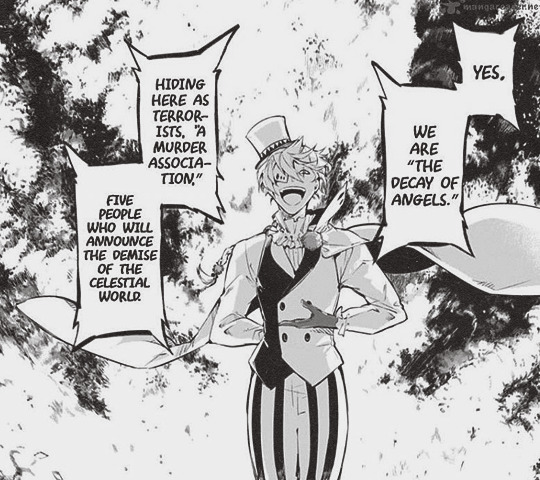
BUNGO STRAY DOGS VS LITERATURE: THE DECAY OF ANGELS
This is going to be the first in a long (long) running series where the goal is to read every single book mentioned by name in Bungo Stray Dogs, and try to connect the themes of that book to the characters who are referencing that book. In light of the recent arc I am starting out with "The Decay of Angels" the villainous organization consisting of Bram Stoker, Nikolai Goggol, Fyodor Dostoevsky, Ochi Fukuchi and Sigma.
The name Decay of Angels comes from Yukio Mishima's novel, the Decay of the Angel. The fourth and last book in his Sea of Fertility tetraology which is widely considered to be his masterpiece. I read all four books, so underneath the cut I'll elaborate on the connections between Yukio Mishima's work and Bungo Stray Dogs.
1. The Decay of the Angel
The Sea of Fertility is a tetralogy of novels written by Japanese AUuhor Yukio Mishima. The four novels are Spring Snow, Runaway Horses, the Temple of Dawn, and the Decay of Angel. The main timeline of the story stretches from 1912 to 1975, the main character of all four books is Shigekuni Honda a law student in Spring Snow, who's best friend Kiyoaki Matsugae dies at the age of twenty at the end of the first book. In each sequel, Shigekuni meet what he believes are the reincarnations of Kiyoaki, who are condemned by karma to die at an early age. Every time he attempts to save them from their deaths he fails.
The strongest connection between the Sea of Fertility itself, and the "Decay of Angels" organization depicted in Bungo Stray dogs is that both are heavily inspired by Buddhist ideology. The Sea of Fertility is an exploration of the concepts of both "reincarnation" and "karma" while the ideology of the decay of angels is to enact Karma in the real world for the past sins of the governing body.
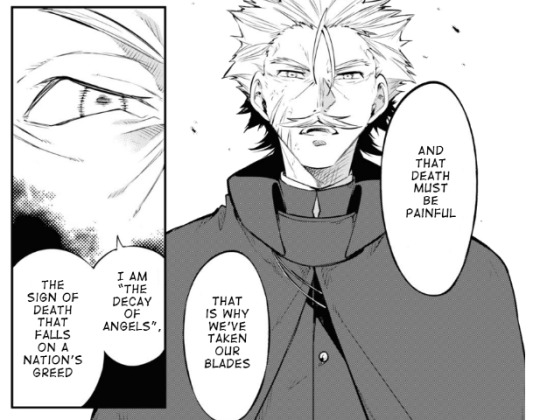
The brihadarankyaka Upanishad states: Indeed the person performing a good deed will become benevolent, and one performing a bad deed will bcome evil; one becomes pure by pure acts, and black by evil acts. Therefore it is said: a human being is composed of karma, or "desire" by following karma one creates will, by following will one creates karma, and through karma, samsara comes into existence."
The Temple of Dawn
Both the ideology of the Decay of Angels, and Yukio Mishima's work make constant references to budhism like this. Budhists conceive of the world as a suffering-laden sycle of life, death and rebirth without beginning or end known as Samsara. In essence in budhism, beings are driven from life to life in this system by karma which is activated by good or ill actions committed in this life as well as previous lives. Fukuchi's goal is more or less to make Karma real and enact it with his hand, to punish governing bodies for their past sins.
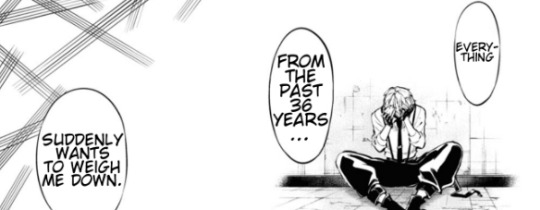
His ideals are also heavily budhist in nature, more or less budhists believe suffering in inherent to life. The goal of budhism is actually to stop being reborn and escape the cycle of death and rebirth by eventually purifying yourself of earthly desires, etc. etc. Fukuchi's goals allign with these ideas. Just like reality and earthly desires inherently cause suffering. As long as governments exists, they will continue to create war. The only way forward is to create a death and rebirth. Governments have to die, so society as a whole can be reborn into a higher, more enlightened state. He is essentially twisting lofty budhist ideals to justify his extreme political actions.

Bungo Stray dogs also borrows some symbolism from the fourth book, the Decay of the Angel. In budhist scripture Devas are mortal angels. A topic the fourth book discusses at length.
Here is the account in the twenty fourth fascicle of the Ekottara-augama: "There are thirty-three angels and one arch angel, and the signs of death in them are fivefold. Their flowered crowns wither, their robes are soiled, the hollows under their arms are fetid, the body ceases to give off light, it loses awareness of itself."
Decay of the Angel

There are five members of the decay of angels in BSD, Fukuchi, Fyodor, Goggol, Bram, and Sigma, just like the five stages of decay. Just as in budhist belief death comes for everything, even the angels, the stated goal of the organization is to bring death to the members of the world's government. Quite literally in Fukuchi's case, by controlling a vampire army (vampires being symbols of death due to being undead and bloodsuckers themselves).
2. Death and Rebirth
The main premise of the Sea of Fertility is tracking the four reincarnations of one individual. Each successive reincarnation lives a short life and dies for the sake of an ideal.
'Kiyoaki Matsugae was caught by unpredictable love, Isao Iiinuam by destiny, Ying Chan by the flesh. And you? By a baseless sense of being different, perhaps? If destiny is something that takes hold of a person and drags him after, then the other three had desinty. And has anything caught you?'
The Decay of the Angel
The whole organization of Decay of Angels, is seeking a somewhat symbolic death and rebirth of society, but at the same time as individuals four members are seeking to die for the sake of an ideal like the four lifetimes of Kiyoaki.

Gogol's may seem to be the simplest, to commit suicide in order to free himself entirely from god's will. He may be a russian character, but even some of his ideals are budhist. One of the major differences between Budhism and Hinduism as commented on in the books, is that Hinduism believes in the divine whereas in Budhism there are no gods. Not only do they reject gods, but they also reject the idea of a "soul."
"Budhism does not recognize the soul as such. If there is no core substance called soul in beings, there is of course, none in organic matter. Indeed quite like a jellfyfish devoid of bone there is no innate essence in all of creation. . If we assume there is no self, what is the basis of the birth-and-death cycle to start with?... WHen the Threavada Sautranika school evolved the concept of "seed perfurming" was established according to which the effect of a good or bad deed remains in ones consciousness, permeating it as the fragnace of perfume permeates clothes and thus forms character."
Gogol's ideal is similiar to that belief, he rejects both the idea of god, and the idea of his soul, in order to prove that all that exists of the universe is his free will and consciousness. He even goes through a metaphorical death and rebirth in order to reach that ideal, he fakes his own death, and then is revealed to be alive.
There's even a discussion of free will in several of the books, particularly the fourth.
"He should have armed them with the foreknowledge that would keep them from flinging themselves after their destinies, take awaay their wings, keep them from soaring, making them march in step with the crowd. The world does not approve of flying. Wings are dangerous weapons. They invite self-dstruction before they can be used."
Decay of the Angel
If you wanted to parallel him to one of the lifetimes, you could even say he is much like Kiyoaki, someone caught up in an unpredictable love. At one point in the story, as he's dying of sickness he continues to try to visit his lady love every day for the sake of seeing her one last time and considers facing his impending death to be a trial to prove his love. Gogol similiarly puts his closest friend through a life or death trial to see if his feelings spring forth from himself and his own free will, or are brainwashing.

"I'd tell myself in it was because I was insincere. I'd know in my heart that if only I had gotten out of the rickshaw and walked, no matter how weak I felt, then such sincerity - even if she was unaware of it - would have affected her, and she would have seen me. That's it then. There's no reason to have such regrets. I have no other choice but to risk my life, if I want to see her. To me, she's the essence of beauty. ANd it's only that which has brought me so far."
-Spring Snow
The second lifetime lived by Kyoaki is that of Inao who is a far-right extremist in Japan, who wishes to see japan return to its more imperialist ideals. As a whole these novels take place over a time frame that's post the russo-japanese wars, all the way to the lead up into world war two, and then post world war two. There are pretty obvious references to world war two (the island where Fukuchi fought on being a reference to Okinawa, Ahabaraki being a reference to the nuclear bomb). Bungo Stray Dogs also clearly takes place in a post-war society. The motivation of the current villain Fukuchi is the mistreatment of soldiers during that previous war.
Fukuchi resembles Isao, the far right extremist. In the second book there is a long recounting of the history of the Satsuma Rebellion. It was a revolt of disaffected samurai against the new imperial government, nine years into the Meiji Era. In the book it’s mentioned they prayed at a shrine a number of times, and waited to rebel until they believed the god’s themselves approved of their rebellion. The main character of the book Isao wants to enact a similar rebellion against the government to rid Japan of western influence and to make the emperor all powerful again.
The sins I refer to have nothing to do with the law. And the greatest sin is that of a man who, finding himself in a world where the sacred light of His Majesty is obscured, neverthless determines to go on living without doing anything about it. The way to purge this grave sin is to make a fiery offering with one's own hand, even if that itself is a sin, to express one's loyalty in action, and then commit seppuku immediately. With death, all is purified
Runaway Horses
The goal of the main character is to "before the sun... at the top of a cliff at sunrise, while paying reverence to the sun... while looking down upon the sparkling sea, beneath a tall, noble pine... to kill myself..." He is a man who wants to commit a sin he believes will put his country on the right track, and then die for his country. He also believes the only way forward is a military coup (guess what happens in japan in a couple of years). Fukuchi's goal may be the opposite, but he still uses the same methodology. He has seized full and total control of the world's governments acting as an ultimate emperor to achieve his goal. Everyone else is just instruments and puppets to him, he literally changes them into mindless zombies.
"Here was the power of the emperor himself. Only on this drill ground was the hand of the sun working with a mathematical clarity and precision. Only here! The will of the emperor penetrated the sweat, the blood, the very flesh of these young men, piercing their bodies like X-Rays."
Runaway Horses
Fukuchi's goal is essentially to fight imperialism by using tools of imperialism himself. He also invokes the divine when fighting against Akutagawa and Atsushi, saying he carries and enacts the divine will. He is focusing all power on himself, the same way Isao wished for the emperor to have total control and authority of the country once more to purge out western, socialist, and capitalist influence.

He also, just like Nikolai experiences a death and rebirth on the battlefield. Fukuchi was once manipulated like Isao by far-right ideals that joining the military would equate to protecting both his comrades and his countries, only to be eaten up and chewed out by the war-machine and not accomplishing protecting anyone but the governments already in place, creating the current Fukuchi.


Just like the deaths of his comrades were wasted, Isao also experiences a disapopinting suicide which is the exact opposite of what he wanted, and the ideal of dying with honor presented throughout the story. Which clearly illsutrates all the militaristic and far-right ideals Isao believed in through the story, were proven false and nil by the end.
“The sun will not rise for some time,” Isao said to himself, “and I can’t afford to wait. There is no shining disk climbing upwards. There is no noble pine to shelter me. Nor is there a sparkling sea.”
Runaway Horses
The third book features Thai Princess Ying Chan who is said to have been caught by the flesh. This will be the shortest section because the third book is very dark, but basically the third book the Temple of Dawn deals with how the elder generation of japan, preys upon and takes advantage of the youth. Ying Chan because of her youthful body, is molested by two adults who she trusts.
Sigma is someone similiar to Ying Chan, a youth who is born and then continually used by everyone around him in his life. He is the ultimate child taken advantage of by society passed over again and again due to being born from "nothing."

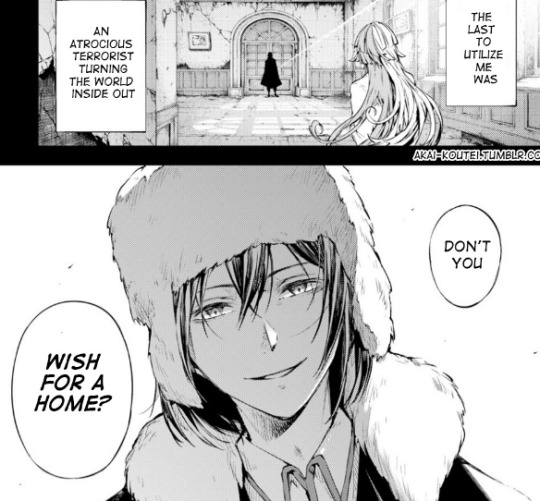
The last reincarnation depicted in the fourth book "The Decay of the Angel" deals heavily with themes of nihilism, and deeply resembles Dostoevsky. Especially if you believe Fyodor is in part an adaptation of Raskolnikov's theory that truly great people should be above morality as depicted in crime and punishment.
Toru's goal in the Decay of Angels, is to devote himself to a pure form of evil and get lost in the pursuit of it. He is depicted as a twenty year old exceptionally brilliant individual who does not form relationships, is detached from the society around them, has no strong pursuits except for this, and his highly nihilistic believes. The kind of nihilism that is portrayed for its flaws in many of Dostoevsky's works.
"My purity will presently wander beyond the horizon to that invisible realm. Probably not on the end of unbearable pain, I shall seek to become a god. The pain! I will know of it, the pain of absolute silence, a world of nothing at all. I will crouch in the corner, like a sick dog. And the happy ones will sing songs around me. There is no medicine for it. No hospital. It will be written in tiny gold letters somewhere in the history of the race: that I was evil."
Which mirrors the description of Fyodor in his introduction as something "Darker than evil, something horrifying."
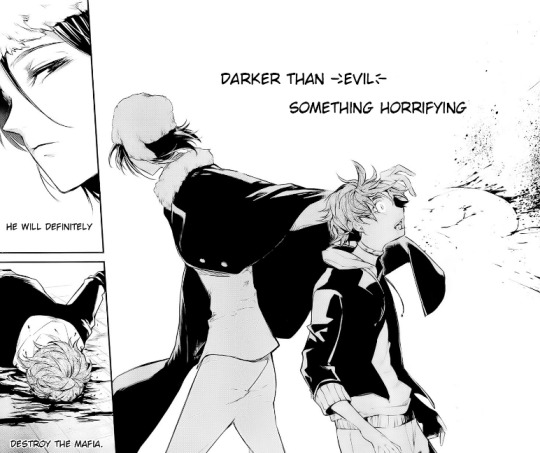
Fyodor is also someone with a large blind spot when it comes to ordinary people, this is something he is lectured on by Dazai. That he believes he has enough control like a player sitting outside of the gameboard that he can control the movment of every single piece. That the world is controlled by great people manipulating it. Whereas Dazai's beliefs are the world is controlled by everyone's actions moving together in an unpredictable fashion, rather than a god sitting outside manipulating things.

Toru receives a similar lecture because he bbelieves himself to be some kind of great man due only to his extra intelligence and how isolated he is from others.
"There is no special right to happiness and none to unhappinnes. There is no tragedy and there is no genius. Your confidence and your dreams are groundless. If there is on this earth something exceptional, special beauty or special evil, nature finds it out and uproots it. You thought didn't you, that you were a genius beyond compensation. You thought of yourself, didn't you, as a beautiful little cloud of evil floating over humanity."
The Decay of the Angel
Which seems to be the lesson that the story is going in the direction of teaching Fyodor, that there is no such thing as inherent specialness, exceptional people, gods or demons.
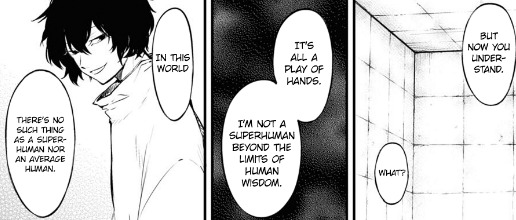
Fyodor is also someone who while he has no undergone a death himself, his goal is to deal death, which he seems to be able to do with just a touch of his hands, in order to make the world reborn into a “world without the evil of ability users”. Death, birth, and rebirth are themes that are strong with all five of these characters.
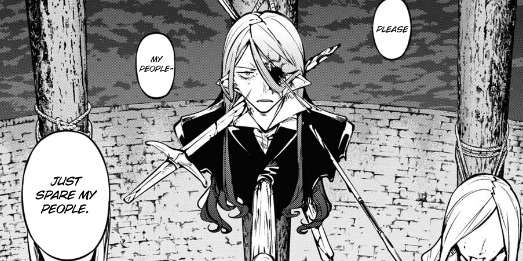
As for Bram he’s the character we know the least about, but I would say while Fyodor, Fukuchi, Gogol and Sigma can be equated to individual lifetimes of Kyoaki, Bram himself being an immortal vampire and oldest of the group is much like Honda who is an outsider and witnessing the lives of young people being reborn over and over again. Especially since by the fourth book he is eighty years old and essentially a helpless elder. The various lifetimes of Kiyoaki die young, he lives on a much emptier life than any of them. Bram’s just a head. He’s the most helpless of the whole group. He’s just a witness to all of this. But he’s also an immortal vampire, so therefore an outsider to the cycle of death and rebirth.
Well, that is all I have to say about “The Decay of the Angel” and the connection to the “Decay of Angels” depicted in Bungo Stray Dogs, and the five members who make it up. I fully reccomend picking up the book, just as Bungou Stray Dogs is shaping up to be anti-war in its text and the depiction of several successive generations (the war generation, the post war, the Sea of Fertility is a massive work referred to as “the most complete vision we have of Japan in the 20th Century” by Paul Theroux. It deals with similiar themes in BSD of the changes between generations, the shift in society of japan in the last century, the influence of imperialism. If you want to pick it up and read it, it comes highly recommended by me!
#bsd meta#bungou stray dogs meta#bungou stray dogs theory#bungou stray dogs#bungou stray dogs analysis#fyodor dostoevsky#bsd fyodor#nikolai gogol#bsd gogol#fukuchi ochi#sigma#literature analysis#the decay of angels#yukio mishima#decay of angels#doa
351 notes
·
View notes